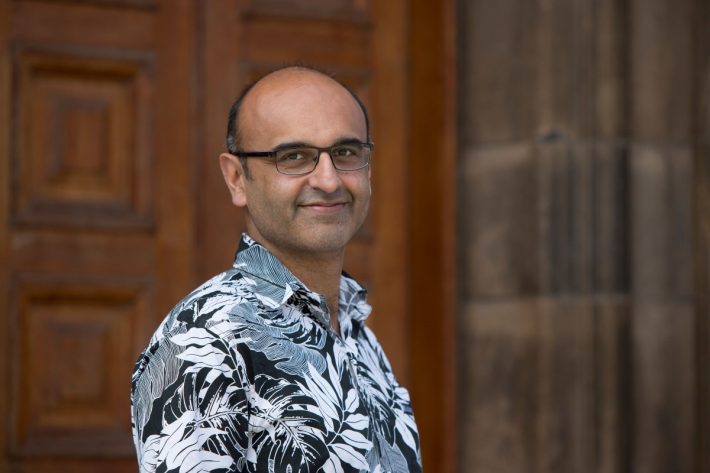New BES President launches future of ecology project
Yadvinder Malhi introduces a new project to define the grand challenges for ecology in the UK as he starts his role as BES President.

Yadvinder Malhi of the University of Oxford has started his two-year term as President of the British Ecological Society (BES).
He steps up to the role having been elected in an online ballot of members in 2020 and serving as President-Elect for the past 12 months.
The BES has also announced a new project to set out priorities for the future of ecological research in the UK. The UK ecological community will come together to examine how ecological research and knowledge can best contribute to addressing the urgent need for scientifically informed protection and restoration of nature.
“Ecology has never been more vital,” says Yadvinder, who will lead the project. “Our science can provide the evidence we need to halt losses in nature and help mitigate the effects of climate change, benefiting our world, our wellbeing and prosperity.”
Two years of achievement
Outgoing president, Jane Memmott of the University of Bristol, brought her term to a close with the Society’s Annual General Meeting on Monday 12 December.
“My two-year term as President has unavoidably been dominated by coronavirus,” Jane admits. “We all know the impact of the pandemic on the research, teaching and practice of ecology, and all that we’ve had to deal with individually and in our organisations.
“Yet I am pleased and proud of all that has been achieved, thanks to the hard work of staff and volunteers,” she adds. “It has been a phenomenal effort. For many of us, it has never been more important to have that feeling of belonging to a community. I believe the BES has done a great job of providing this.”
During Jane’s presidency the Society has:
- Launched a one-stop shop for information from all sectors of applied ecology and conservation in Applied Ecology Resources
- Published a landmark policy report on implementing nature-based solutions in the UK
- Started a green transformation of 50 schools in North-East England, thanks to a £250,000 government grant
- Achieved double-digit growth in membership numbers
- Held an online Annual Meeting in 2020 that broke all records for numbers of delegates, part of moving so many of the Society’s activities online in response to COVID-19
Jane remains a trustee of the BES for the next year as Past President of the Society, and will also be on the panel overseeing ‘The Future of Ecological Research in the UK’ project with Yadvinder.
A presidential vision
Yadvinder is looking to start his presidency on the front foot. “As president-elect over the past year, I’ve seen what a well-run ship the Society is and how much it does,” he says. “I’ve also realised how quickly the years pass. If I’m to have a contribution, it’s important that I have a vision early on.”
Yadvinder is determined that the ecological community steps up and plays a full role in nature recovery efforts in the UK and internationally.
“The next few years will be transformative,” he says. “There is broader societal awareness of the desperate need to halt the decline in nature. There is political will and business is signing up too. For the first time, the biodiversity crisis is up there with climate change in public perception.”
While there may be more will to protect nature and more resources available, we have little experience of how to do restoration at scale. Yadvinder believes that this is where ecologists must play their part. “Ambitious plans must be made and they must be ecology-informed and evidence-rich,” he says.
For the first time, the biodiversity crisis is up there with climate change in public perception
The new ‘The Future of Ecological Research in the UK’ project launched today is one example of how the BES can contribute. The project aims to develop a unified vision of the grand challenges for ecology and how they can best be met. It will canvass views across the full breadth and diversity of the ecology community, so there will be plenty of opportunity for UK ecologists to get involved.
Boosting diversity
Promoting and increasing ethnic diversity in ecology is another priority for Yadvinder: “I want people from under-represented ethnic groups to see how exciting ecology is and know they can belong.”
“I know myself growing up in an Indian household in the UK that ecology is often not thought of as a career, as a vocation. It’s doctors and lawyers that comes first,” he adds. “It’s also hard in urban communities to get into the countryside and seed that love for nature and the environment.”
I want people from under-represented ethnic groups to see how exciting ecology is
As the first British Asian president of the BES in its more than 100 year history, Yadvinder says he can help counter this by being something of a figurehead for diversity. He hopes to give extra visibility for what the BES is already doing, for example in the growing REED Ecological Network for ecologists from marginalised ethnicities.
“Together we need to discover how we can increase our diversity, what works,” says Yadvinder.
Like what we stand for?
Support our mission and help develop the next generation of ecologists by donating to the British Ecological Society.